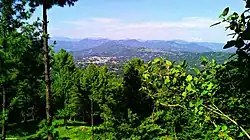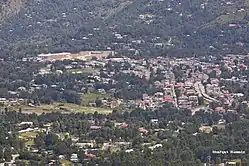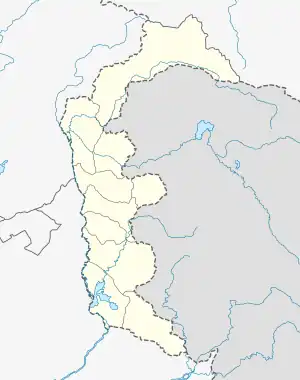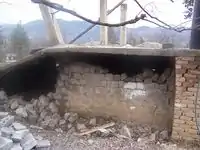Rawalakot
راولا کوٹ | |
|---|---|
Town | |
  A view of Rawalakot | |
 Rawalakot | |
| Coordinates: 33°51′12″N 73°45′05″E / 33.85333°N 73.75139°E | |
| Administering country | |
| Administrative Territory | |
| District | Poonch District |
| Elevation | 1,638 m (5,374 ft) |
| Population (2017)[1] | |
| • Total | 56,006 |
| • Estimate (2018) | 56,590 |
| • Density | 375/km2 (970/sq mi) |
| Languages | |
| • Official | Urdu[2][3][note 1] |
| • Spoken | |
| Time zone | UTC+5 (PST) |
| 05824 | 0092 |
| Number of towns | 3 |
| Number of Union councils | 21 |
Rawalakot (Urdu: راولا کوٹ ) is the capital of Poonch district in Azad Kashmir, Pakistan. It is located in the Pir Panjal Range.[4]
History
1947 Poonch rebellion
On 15 June 1947, Sardar Ibrahim Khan addressed a meeting in Rawalakot attended by 20,000 people, and gave a speech telling his audience that Pakistan, a Muslim state, was coming into being and the people of Jammu and Kashmir could not remain unaffected. After that day, he says, "a strange atmosphere took the place of the usually peaceful life in these parts".[5] On 22 June, Chaudhary Hamidullah, the acting president of the Muslim Conference, visited Rawalakot and initiated secret plans to organise the ex-servicemen of the district for an eventual confrontation with the Dogra State Forces.[6] On or around 6 October, the armed rebellion started in the Poonch district.[7][8] The fighting elements consisted of "bands of deserters from the State Army, serving soldiers of the Pakistan Army on leave, ex-servicemen, and other volunteers who had risen spontaneously."[9] The rebels quickly gained control of almost the entire Poonch district, including Rawalakot.
1955 Poonch uprising
Along with Pallandri, Rawalakot was the focal point of the 1955 Poonch uprising. It was led by the local Sudhans who disapproved of Sher Ahmed Khan and wanted Sardar Ibrahim Khan, as well as democratic reforms.[10]
2005 Kashmir earthquake
On Saturday, 8 October 2005[11] a 7.6 magnitude earthquake killed 73,338 people and left up to three million homeless in Pakistan, including Azad Kashmir. The city of Rawalakot, the capital of the Poonch, suffered significant damage from the 2005 Kashmir earthquake; although most of the buildings were left standing, many of them were rendered uninhabitable, and some of the population was left homeless. Most of the buildings have been reconstructed.



Location
Rawalakot is located at Latitude 33°51'32.18"N, Longitude 73° 45'34.93"E and an Elevation of 5374 feet. Rawalakot is approximately 76 kilometres (47 mi) from Kahuta and about 120 km (75 mi) from the city of Rawalpindi, Pakistan. It is linked with Rawalpindi and Islamabad via Goyain Nala and Tain roads. Via Kotli Satiyan and Kahuta. It is also linked with Rawalpindi via Sudhnuti.[12]
Transport
Travel routes
Construction of the Ghazi-e-Millat road (also known as Guoien Nala road) between Rawalakot and Azad Pattan has considerably reduced travel time, it is main road which is connecting Islamabad/Rawalpindi to Rawalakot city.
Road links
The road passing through Pakgali-Paniola connects Rawalakot to Bagh, Rawalpindi and Muzaffarabad. The alternative road that passes through Mohri Farman Shah, Shuja Abad is the shortest possible road link that connects Rawalakot city with Bagh. Murree, Islamabad and Rawalpindi are situated in a southward direction from Rawalakot. The town has another road link with Kotli.[13]
Airport
Rawalakot Airport is non-operational and it has been closed since October 2005.[14]
Climate
Rawalakot features a subtropical highland climate under the Köppen climate classification due to high altitude. The weather of Rawalakot is quite erratic. However, the climate of Rawalakot can be divided into four seasons, namely spring, summer, autumn and winter. Rawalakot has mild to warm temperatures during the spring and autumn, humid temperatures during the summer and cold to snowy during the winter. The temperature can rise as high as 38 °C (100 °F) during the mid-summer months and drop below −1 °C (30 °F) during the winter months. Snowfall occurs in December and January, while most rainfall occurs during the monsoon season stretching from July to September.[15]
| Climate data for Rawalakot, Azad Kashmir | |||||||||||||
|---|---|---|---|---|---|---|---|---|---|---|---|---|---|
| Month | Jan | Feb | Mar | Apr | May | Jun | Jul | Aug | Sep | Oct | Nov | Dec | Year |
| Record high °C (°F) | 25.6 (78.1) |
32.9 (91.2) |
34.4 (93.9) |
41.0 (105.8) |
45.0 (113.0) |
46.6 (115.9) |
43.2 (109.8) |
40.0 (104.0) |
39.4 (102.9) |
39.9 (103.8) |
33.3 (91.9) |
28.9 (84.0) |
46.6 (115.9) |
| Mean daily maximum °C (°F) | 17.3 (63.1) |
19.8 (67.6) |
24.7 (76.5) |
30.6 (87.1) |
36.3 (97.3) |
38.1 (100.6) |
34.8 (94.6) |
33.5 (92.3) |
33.2 (91.8) |
30.4 (86.7) |
25.2 (77.4) |
19.7 (67.5) |
28.6 (83.5) |
| Mean daily minimum °C (°F) | 3.8 (38.8) |
6.7 (44.1) |
11.1 (52.0) |
15.9 (60.6) |
21.0 (69.8) |
23.8 (74.8) |
24.3 (75.7) |
23.6 (74.5) |
21.1 (70.0) |
14.8 (58.6) |
8.8 (47.8) |
5.0 (41.0) |
15.0 (59.0) |
| Record low °C (°F) | −2.6 (27.3) |
0.0 (32.0) |
2.8 (37.0) |
3.3 (37.9) |
10.0 (50.0) |
13.0 (55.4) |
12.0 (53.6) |
12.7 (54.9) |
13.0 (55.4) |
1.9 (35.4) |
0.0 (32.0) |
−3.3 (26.1) |
−3.3 (26.1) |
| Average rainfall mm (inches) | 24.9 (0.98) |
30.8 (1.21) |
31.2 (1.23) |
20.1 (0.79) |
14.4 (0.57) |
44.1 (1.74) |
112.8 (4.44) |
136.3 (5.37) |
43.8 (1.72) |
15.7 (0.62) |
14.5 (0.57) |
19.1 (0.75) |
507.7 (19.99) |
| Source: [16] | |||||||||||||
Demography
Rawalakot has an urban population of 56,006 people according to the 2017 census which rose to 56,590 in 2018.[1] Majority of Rawalakot’s population is ethnically Sudhan.
Notes
- ↑ Snedden (2013, p. 176): On p. 29, the census report states that Urdu is the official language of the government of Azad Kashmir, with Kashmiri, Pahari, Gojri, Punjabi, Kohistani, Pushto, and Sheena 'frequently spoken in Azad Kashmir'. Yet, when surveyed about their 'mother tongue', Azad Kashmiris' choices were limited to selecting from Pakistan's major languages: Urdu, Punjabi, Sindhi, Pushto, Balochi, Saraiki, and 'others'; not surprisingly, 2.18 million of Azad Kashmir's 2.97 million people chose 'others'.
References
- 1 2 "Statistical Year Book 2019" (PDF). Statistics Azad Jammu and Kashmir. Retrieved 12 September 2023.
- ↑ "Kashmir".
- ↑ Rahman, Tariq (1996). Language and politics in Pakistan. Oxford University Press. p. 226. ISBN 978-0-19-577692-8.
- ↑ "The untold history behind Rawalakot's name - Azadi Times". Azadi Times. Retrieved 8 August 2022.
- ↑ Suharwardy (1983, p. 102); Ibrahim Khan (1990, pp. 57–58)
- ↑ Saraf (2015), p. 83.
- ↑ ul-Hassan, Syed Minhaj (2015), "Qaiyum Khan and the War of Kashmir, 1947–48 AD." (PDF), FWU Journal of Social Sciences, 9 (1): 1–7
- ↑ Ganguly, Sumit (September 1995), "Wars without End: The Indo-Pakistani Conflict", The Annals of the American Academy of Political and Social Science, Sage Publications, 541: 167–178, doi:10.1177/0002716295541001012, JSTOR 1048283, S2CID 144787951
- ↑ Zaheer (1998), p. 113.
- ↑ Snedden, Christopher (2013). Kashmir: The Unwritten History. India: Harper Collins Publishers. ISBN 978-9350298978.
- ↑ "Earth Quake 2005". Drgeorgepc.com. Retrieved 1 October 2012.
- ↑ "LOC Updates: 2 Civilians Killed, 1 Injured in Indian Army Firing in Poonch". 25 June 2023. Retrieved 25 June 2023.
- ↑ "Rawalakot: Blocking of roads due to sit-in, 13 more persons arrested". Azadi Times. Retrieved 8 August 2022.
- ↑ Ahmed, Amin (3 May 2015). "CAA calls for making Muzaffarabad, Rawalakot airports operational". Dawn.
- ↑ Pakistan Meteorological Department Kaleem Abbasi, 15 Aug, 2014 Archived 20 January 2012 at the Wayback Machine
- ↑ "Rawalakot, Azad Kashmir". Climate Charts. Retrieved 14 June 2013.
Sources
- Ibrahim Khan, Muhammad (1990), The Kashmir Saga, Verinag
- Saraf, Muhammad Yusuf (2015) [first published 1979 by Ferozsons], Kashmiris Fight for Freedom, Volume 2, Mirpur: National Institute Kashmir Studies
- Suharwardy, Abdul Haq (1983), Tragedy in Kashmir, Wajidalis
- Zaheer, Hasan (1998), The Times and Trial of the Rawalpindi Conspiracy, 1951: The First Coup Attempt in Pakistan, Oxford University Press, ISBN 978-0-19-577892-2
External links
 Azad Jammu and Kashmir travel guide from Wikivoyage
Azad Jammu and Kashmir travel guide from Wikivoyage- Britannica – Azad Kashmir
- World atlas page about Azad Kashmir status